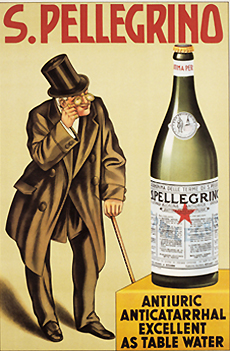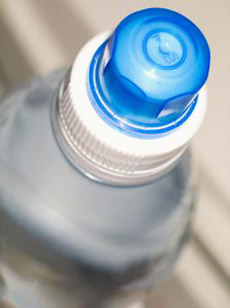

We love San Pellegrino, a naturally bottled mineral water, for its high concentration of bicarbonate, calcium, chloride, magnesium and sulphate, which give it a rich, lively flavor. Little did we know it is also an antiuric and anticatarrhal (translation: a cure for gout and phlegm).
|
MICHAEL MASCHA is the Water Editor of THE NIBBLE and the founder of FineWaters.com, the world’s leading website on bottled water.
|
|
January 2009
|
 |
Should You Buy Bottled Water?
Cogent Comments From A Bottled Water Expert
Page 1: Commodity Bottled Municipal Water
CAPSULE REPORT: Bottled water is a hotly-contested topic these days. After several years of impressive growth, sales have recently declined. Much of the the decline is attributed to environmental issues, specifically, the amount of plastic bottles going into landfill. Bottled water expert Michael Mascha explains the difference between commodity bottled water and naturally bottled water, and why you should consider buying one and not the other. This is Page 1 of a two-page article. Click on the black link below to visit Page 2.
Much of the bottled water sold in the United States is really bottled municipal tap water. Government and industry estimates are that filtered municipal water comprises up to 40% of the bottled water sold. It makes no sense to buy this processed tap water. If you are not happy with the way your own tap water tastes, you would be much better off buying a water filter. You’d save money, gas, your own energy hauling, storage...not to mention the environmental benefit of reducing the amount of PET plastic bottles produced and disposed of by more than 40%.
Most consumers confuse two distinctly different types of bottled water:
Commodity Bottled Water
 This is bottled municipal water; the bottle provides a convenient package for on-the-go hydration. Water fountains or sinks would work just as well to quench your thirst, but water companies’ self-serving marketing campaigns persuade you consumers that water is better tasting and healthier when it comes from a bottle. This is bottled municipal water; the bottle provides a convenient package for on-the-go hydration. Water fountains or sinks would work just as well to quench your thirst, but water companies’ self-serving marketing campaigns persuade you consumers that water is better tasting and healthier when it comes from a bottle.
The water is a commodity, regardless of where the water comes from or what brand name is on the bottle. Convenience is the key; the water itself is nothing special. Unfortunately, the large, powerful companies behind these waters control distribution and ensure that their products are the ones found in the supermarkets, delis, entertainment venues, and so forth. Instead of paying for commodity water, simply buy a sturdy water bottle (or recycle one you’ve already bought until it wears out), refill it from your tap, and carry it with you.
Photo by Carlos Paes | SXC.
Commodity bottled water is the reason that some journalists have condemned bottled water as a scam, and I can understand their thinking. I would be angry, too, if I purchased a bottle of water only to discover that it was merely filtered tap water. But because I know better, I buy the second type of water, naturally bottled water. Understand the difference on the next page.
Continue To Page 2: Naturally Bottled Water
Go To The Article Index Above

|